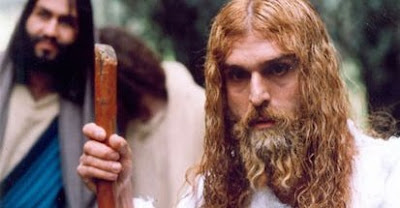Last updated on: February 23, 2008 at 11:02 pm
By
Peter T. Chattaway

A few days ago, ABC News posted its own story on Jesus, the Spirit of God, the Iranian film and mini-series that tells the story of Jesus from a Muslim point of view. The story is a Q&A; with director Nader Talebzadeh, who reveals that the film is based partly on sources other than the Bible and the Koran:
LS: So, when it comes to Jesus, the message and the reverence are there.
NT: Yes.
LS: But the virgin birth, the crucifixion…
NT: The virgin birth was the same. The difference in the Koran, God says Jesus was saved. Instead of having him hung and crucified, the person who betrayed Jesus was crucified. This is how the Koran sees it, through the Gospel of Barnabas.
LS: So, you gave the alternate ending.
NT: Yes, two endings. I thought, the Christians, when they see it, it’ll be important for them. [In the Koran] God says, emphatically, he was not crucified. Somebody was crucified in his stead. In the Gospel of Barnabas, there are explications of this. The majority of [Muslims] say the one who betrayed Jesus [was crucified]. . . .
LS: What is your hope for the movie?
NT: The film is an excuse to sit down and talk. Iran is so consistently demonized. Once an American visits Iran, they know it’s a different story. So, how do we export our thinking? It’s the movies. This is a film for students and for practicing Christians, for people to become curious, and go investigate more.
My hope for the movie was, and is, and will be, to make people think about how God sees the prophets, how God talks about Jesus in the Koran. What was the main message of Jesus? And what was censored out of history? Part of the message of Jesus was censored out, which was the coming of the next prophets.
If you listen to what Jesus said, Jesus talked about the Prophet Mohammad, many, many times. And it was eliminated in the Gospels and the Bibles that [made it through] history. In 325, the Council of Nice was out to destroy all the other Gospels. One of those Gospels was the Gospel of Barnabas, which I used in great detail.
LS: And what did that say that was left out?
NT: It had a lot of sermons of Jesus that you do not see in the Bible; miracles, and at least a hundred references to the Prophet Mohammad, about his coming. It’s one of the biggest censorships of history. So, I thought somebody should say this, and then others might disagree, say, “Ahhh, this could not be! This is blasphemy!” But it’s OK — this is the 21st century. It’s time for information. It’s time for communication. They can go check it out.
The ABC News story is accompanied by a one-minute video, which also states that “there are actually two endings to the movie: one from the Christian Bible, and one from the Koran.” What this means, exactly, I am not sure. Is the film being released in two versions, each with a different ending? Or does the standard version of the film show one ending and then rewind to an earlier point in the story and show an entirely different ending?
As for the Gospel of Barnabas, I know very little about it, but if the article at Wikipedia is correct, it would seem to be a forgery created at some point in the 1500s, with perhaps some earlier materials blended in. So, colour me skeptical.
Then again, this wouldn’t be the first film to “enhance” a biblical story with non-canonical material taken from medieval or modern texts; just think of the Catholic mystics whose visions were dramatized by Mel Gibson in The Passion of the Christ (2004).
APR 5 UPDATE: Matt Page has discovered a month-old CNN video that includes several clips from this film, including the scene where Judas is transformed so that he looks like Jesus.
 Christians aren’t the only ones who hold Jesus in high esteem. Muslims do too, though they have radically different beliefs about him — and at least one movie has actually tried to dramatize those beliefs the same way other Bible movies have dramatized their own filmmakers’ beliefs.
Christians aren’t the only ones who hold Jesus in high esteem. Muslims do too, though they have radically different beliefs about him — and at least one movie has actually tried to dramatize those beliefs the same way other Bible movies have dramatized their own filmmakers’ beliefs.







.jpg)





